- U of R Home
- Graduate Studies Research
- URGRADEXPERIENCE
- Student Success
Student Success

Zohra Zahir
Once, an elder told a friend of Zohra’s: follow whatever interests you. As you move from one thing to the next, it may feel foreign or unrelated, but later your life will look as if you planned it that way. Zohra has lived exactly that way.
Zohra's first love was books. As a nine-year-old refugee, when UNICEF officials asked what children needed most, she asked simply for books. They sent her 600 children’s books, which she used to create a small library behind her father’s clinic. After returning to Afghanistan in 2004, she followed new interests again becoming one of her town’s youngest reporters at 15 and co-founding a magazine at 17 while attending medical school. While circumstances made her leave Afghanistan, she discovered a fascination with stem cells. She moved to India, earning a BSc in Environmental Sciences and an MSc in Genetics. During that time, she translated a book about an Afghan resistance line during the Soviet Union era, and as a poet, she was featured in multiple South Asian poetry festivals, with her poems translated into several languages. Last year, she completed her PhD in microbial biogeochemistry from the University of Regina. In 2024, she represented UofR at the UN Biodiversity Conference in Colombia, advocating for scientists and youth engagement. She is now a postdoctoral research fellow working on astrobiology in the Department of Earth Science at the University of Toronto and a postdoctoral Junior Fellow at Massey College.
About my research: My research focuses on what scientists call the “phosphate problem”. Phosphorus is a key ingredient of life, it’s part of DNA, RNA, cell membranes, and energy molecules like ATP, yet it is often scarce or locked away in minerals. Understanding how phosphorus becomes available (or unavailable) is crucial for explaining how life could emerge and persist, both on early Earth and on other planets.
I study modern natural systems, such as alkaline lakes, as analogs for early Earth environments. By examining how phosphorus interacts with various elements (abiotic) and microbial processes (biotic), I investigate the geochemical pathways that control phosphorus availability. By linking sediment geochemistry, microbes, and planetary environments, my work helps constrain where and under what conditions life could arise and where we might look for it beyond Earth.
Check out her article in Science and more on UT Social Media.

Jade Fisher
My whole life I always had a passion to learn, earning the title of "Teacher's Pet" in elementary school, though it never bothered me because I always believed knowledge is power. Despite making the honor roll all 4 years of high school, believe it or not, biology and chemistry were my lowest grades. It was not until I was out of school for a few years that I started thinking about how to use my strongest skill, math, for a career with more excitement than an accountant. This is when I learned that chemistry weighed heavily on mathematics so I enrolled in Siast (now referred to as Saskatchewan Polytechnic) to upgrade my chemistry course to be eligible for applying to the UoR. It became very clear that high school science was only hard because there was so much to learn in such a short time. It was a game changer once I had a teacher who was enthusiastic about science, and my grade significantly improved and I was excited to pursue a career in Chemistry. While my journey began in 2016 when I joined the UoR in pursue of a Bachelor's degree in Chemistry, within 2 years I began falling in love with Biology prompting me to transfer into Biochemistry to achieve the best of both worlds. Throughout undergrad, I developed a deep drive to learn and understand how biological systems worked and through hard work and determination, I was lucky enough to join Dr. Mohan Babu's Lab in the spring of 2022 in pursuit of a Master's degree in Biochemistry. Where I began blending quantitative genetics, integrated genomics, systems proteomics and interactome network mapping to comprehensively uncover the multiple aspects of human disease, shaping the scientist I am grateful to be today.
Description of my research and the Science Exposed 2025 People's Choice winning image (click here for image):
Neurons control every regulatory process in our bodies through electrical and chemical signals, relying on mitochondria for energy. When mitochondria are malfunctioning, they contribute to neuronal dysfunction and neurodegenerative diseases, among them autosomal recessive spastic ataxia of Charlevoix-Saguenay, a rare genetic disorder that affects movement and coordination. Learning more about neuronal dysfunction is key to developing treatments. This micrograph shows motor neurons derived from iPSCs (induced pluripotent stem cells), cells taken from a patient and reprogrammed into neural cells. Three fluorescent markers highlight key structures—the nuclei (blue), axons (red) and dendrites (green)—and create a captivating sunset-like pattern. However, like a sunset fades into night, patients with this disorder will eventually lose their motor neurons to the cover of darkness. By studying patient-derived neurons, I aim to uncover the mechanisms behind neurodegeneration, paving the way for potential treatments.

Ali Molaeitabari
I am currently pursuing my PhD in Biochemistry at the University of Regina under the supervision of Dr. Tanya E. S. Dahms, a charismatic and inspiring supervisor that anyone would be lucky to have :). I also completed my MSc in Genetics and my BSc in Cell and Molecular Biology in Iran before joining the University of Regina. In my free time, I enjoy playing piano and learning French.
Description of my research and as a finalist in Science Exposed 2025, my image (click here for image):
My research focuses on the human fungal pathogen Candida albicans, with the aim of identifying novel antifungals for patients suffering from invasive candidiasis. I am working on the fungicidal activity of the phenolic compound carvacrol on C. albicans and its potential underlying mechanism of action. One of the benefits in the Dahms Lab is that we can also study the biophysical properties and ultrastructure of the cell envelope by Atomic Force Microscopy (AFM), in addition to biochemical, molecular, and other microscopical approaches.
My research image for Science Exposed 2025 is a mycelium, a web of filaments grown by C. albicans. When C. albicans produces an aggressive filamentous form, it can invade organs and produce biofilm, causing serious infections.
LinkedIn: www.linkedin.com/in/ali-molaeitabari-21366b100
Dahms Lab Website: https://sites.google.com/view/dahms-lab/home

Kelsey Haczkewicz
My name is Kelsey, and I am a second-year PhD student in clinical psychology. My primary research interests focus on the mental health of older adults and family caregivers. Specifically, I am interested in caregiver stress, family involvement in long-term care, and the effectiveness of mental health interventions for older adults and their caregivers. I am currently working on my dissertation project, which examines the effectiveness of a single-session Acceptance and Commitment Therapy (ACT) intervention for informal caregivers of long-term care residents.
Congratulations to Kelsey, winner of the FGSR Storytelling Competition. Watch her winning submission here.

Yaren Koca
I’m a PhD candidate in the Experimental and Applied Psychology program under the supervision of Dr. Chris Oriet. I am from Türkiye where I also did my Bachelor of Arts in Psychology. I moved to Canada in 2019 to pursue grad school and have lived in Regina since. I enjoy learning about the human mind (duh!), philosophy, coding, yoga, aerial fitness, endurance running, visual arts and design, and anything in between where I can learn and craft stuff!
Research Information:
I like learning how we remember the things that we see. Specifically, I study how our memories store facial identity so that we can recognize the people we know. On one hand, all faces look the same with two eyes at the top, a nose in the middle and a mouth at the bottom. On the other hand, one person’s face can look very different from one time we seem them to the next. In fact, every person’s face changes in ways that are unique to them like a fingerprint. Our ability to recognize faces then, involves dealing with two opposite problems: homogeneity between people and variability within person. How do we organize faces in memory in a way that deals with these opposing problems? In my master’s thesis, I found that we average a person’s face as we become familiar with them. Because an average retains commonalities across items that are otherwise different, it helps us tolerate the changes in people’s appearance. In my doctoral dissertation, I found that we represent facial identity as clusters of different views within a multidimensional psychological space with their average at the centre of these clusters. For my postdoctoral research, I aim to investigate the higher-level conceptual and social factors that influence our representation of facial identity, and how these factors can be integrated with perceptual accounts of face recognition.
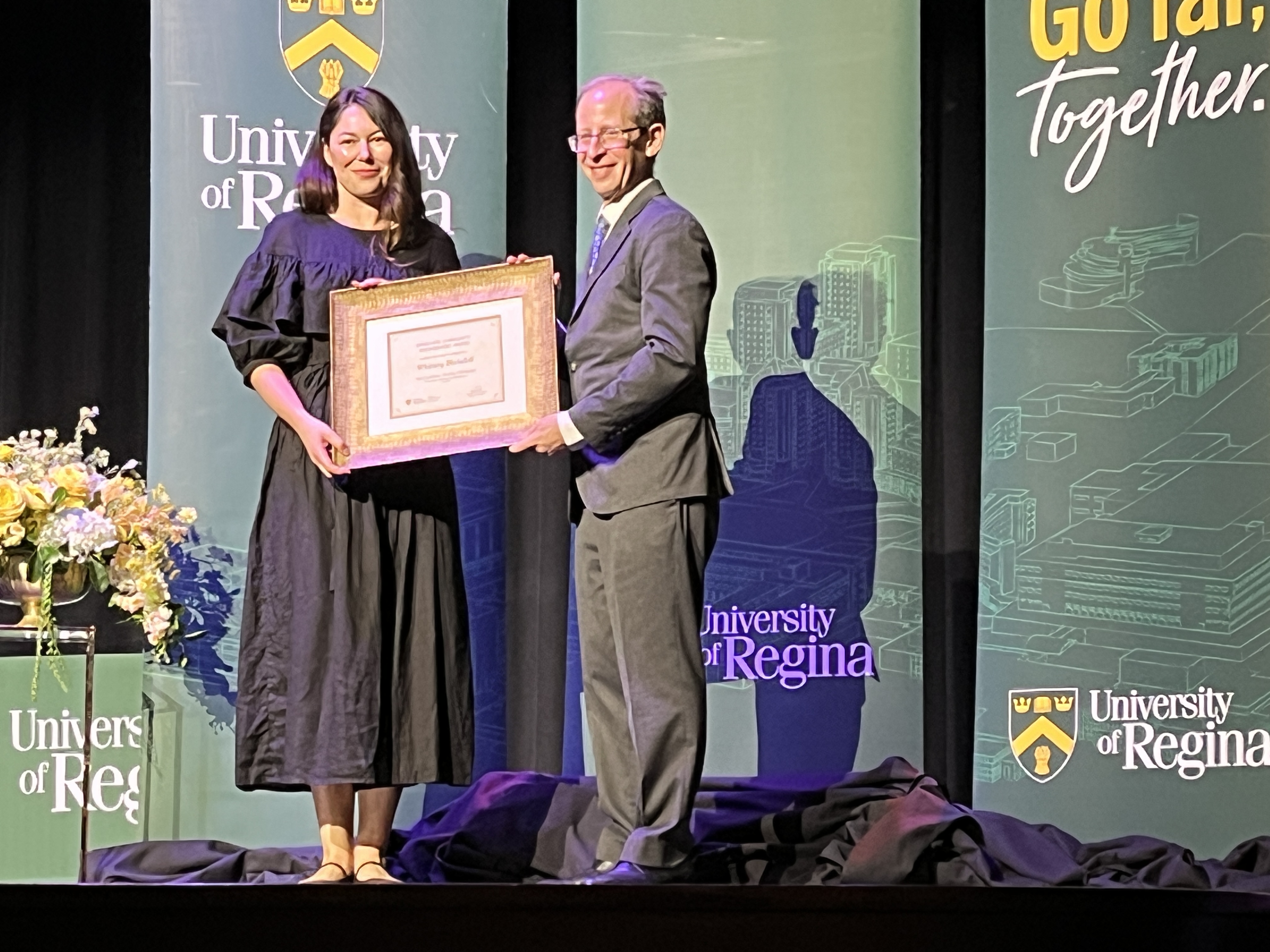
Whitney Blaisdell
Whitney Blaisdell is the receipient of the Graduate Community Engagement Award recipient. Whitney’s work explores how children and families can reimagine and reclaim public play spaces in urban prairie communities—research that combines creativity, collaboration, and advocacy. Building on this vision, she founded Project Play YQR, a non-profit organization dedicated to removing barriers to play for all children.
Through partnerships with the City of Regina, the MacKenzie Art Gallery, Regina Open Door, and the Regina Public Library, Whitney has led programs that have served more than nine hundred children and families—transforming how we think about inclusion, access, and public space. Her advocacy for play has extended to developing a website for families and educators, giving presentations to community groups, and consulting on the design of local parks.
Her scholarly achievements are equally impressive: maintaining a GPA of 92.6%, earning over two hundred thousand dollars in scholarships and research funding, and publishing widely on education and community development. Her supervisor, Dr. Marc Spooner, describes her research program as being “at the nexus of scholarship, participatory community engagement, and tangible action and change.”
Whitney’s work exemplifies the power of research in action—where academic inquiry becomes a force for connection, creativity, and belonging. We are proud to honor Whitney Blaisdell as this year's Graduate Community Engagement Award.
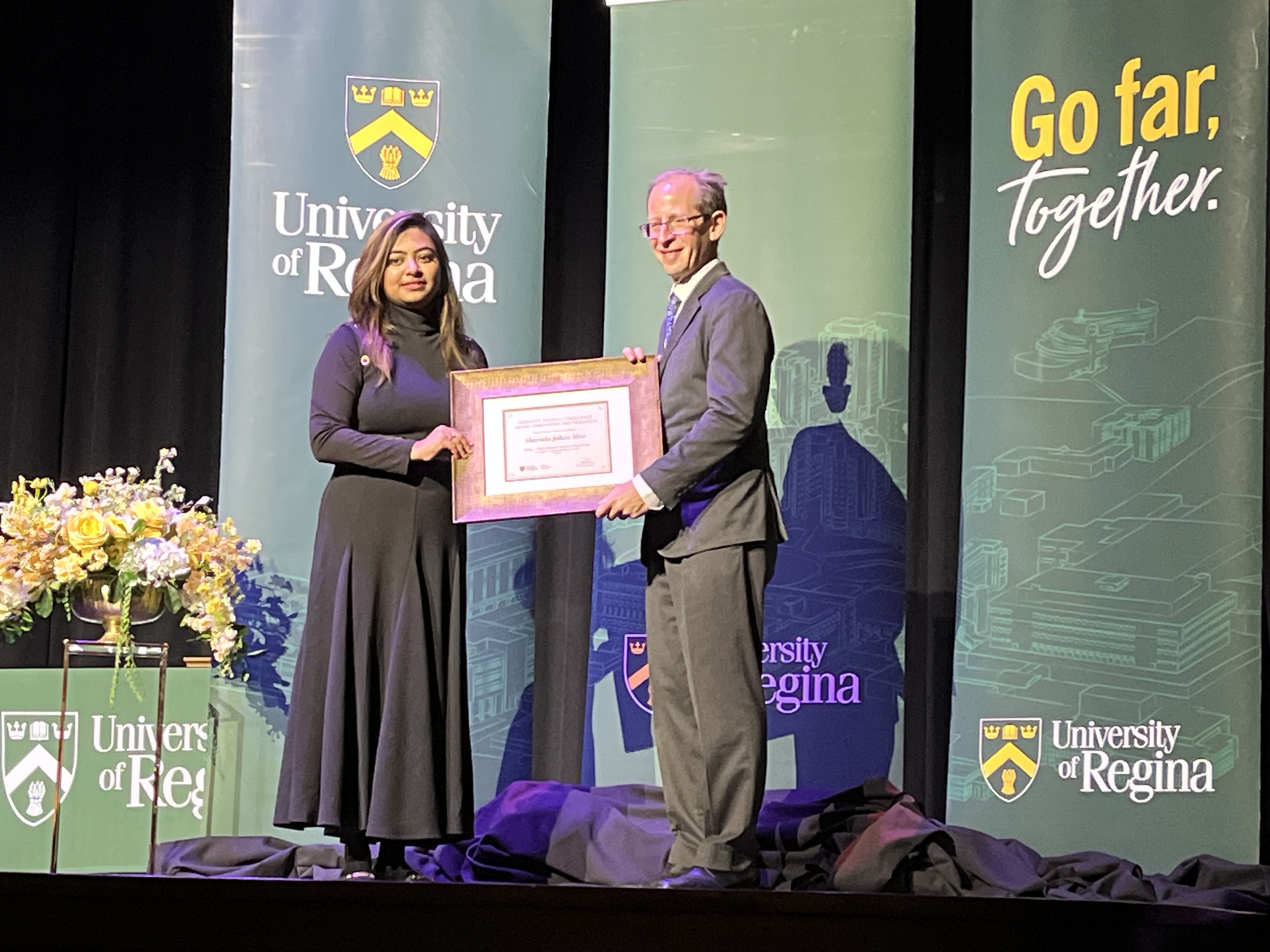
Sharmin Jahan Mim
Sharmin Jahan Mim was the recipient of the Graduate Excellence Award in Innovation and Research, recognizing her remarkable scholarly achievements, creativity, and leadership in research.
Since enrolling in her Master’s program in Applied Science in Environmental Systems Engineering at the University of Regina in 2023, Sharmin has demonstrated exceptional academic performance, maintaining a GPA above ninety percent, and garnering multiple recognitions such as the Saskatchewan Innovation and Excellence Graduate Scholarship and two RCE Saskatchewan Education for Sustainable Development Awards.
Ms. Mim’s recent research project focuses on sustainable waste management, specifically the issue of textile waste. As Dr. Amy Richter described, “her contributions to the field of textile waste management include developing a method to understand the spatial and temporal aspects of post-consumer textile waste generation. This contribution is cutting-edge, increasing understanding surrounding textile waste generation habits.” In just two years, Sharmin has co-published ten journal articles (three as first author) and four conference papers, nine of them in high-impact international journals. Her supervisor, Dr. Kelvin Ng, has noted her original and significant contributions to waste management systems in Canada and beyond.
Beyond her research excellence, Sharmin has served as a mentor in the She’s Here Mentorship Program for female and gender diverse students, lab instructor, and Campus Ambassador, fostering a collaborative and inclusive learning environment for her peers. Her dedication to professional growth, leadership, and research impact make her an inspiring example of graduate achievement.
We are proud to honor Sharmin Jahan Mim as this year’s recipient of the Graduate Excellence Award in Innovation and Research.
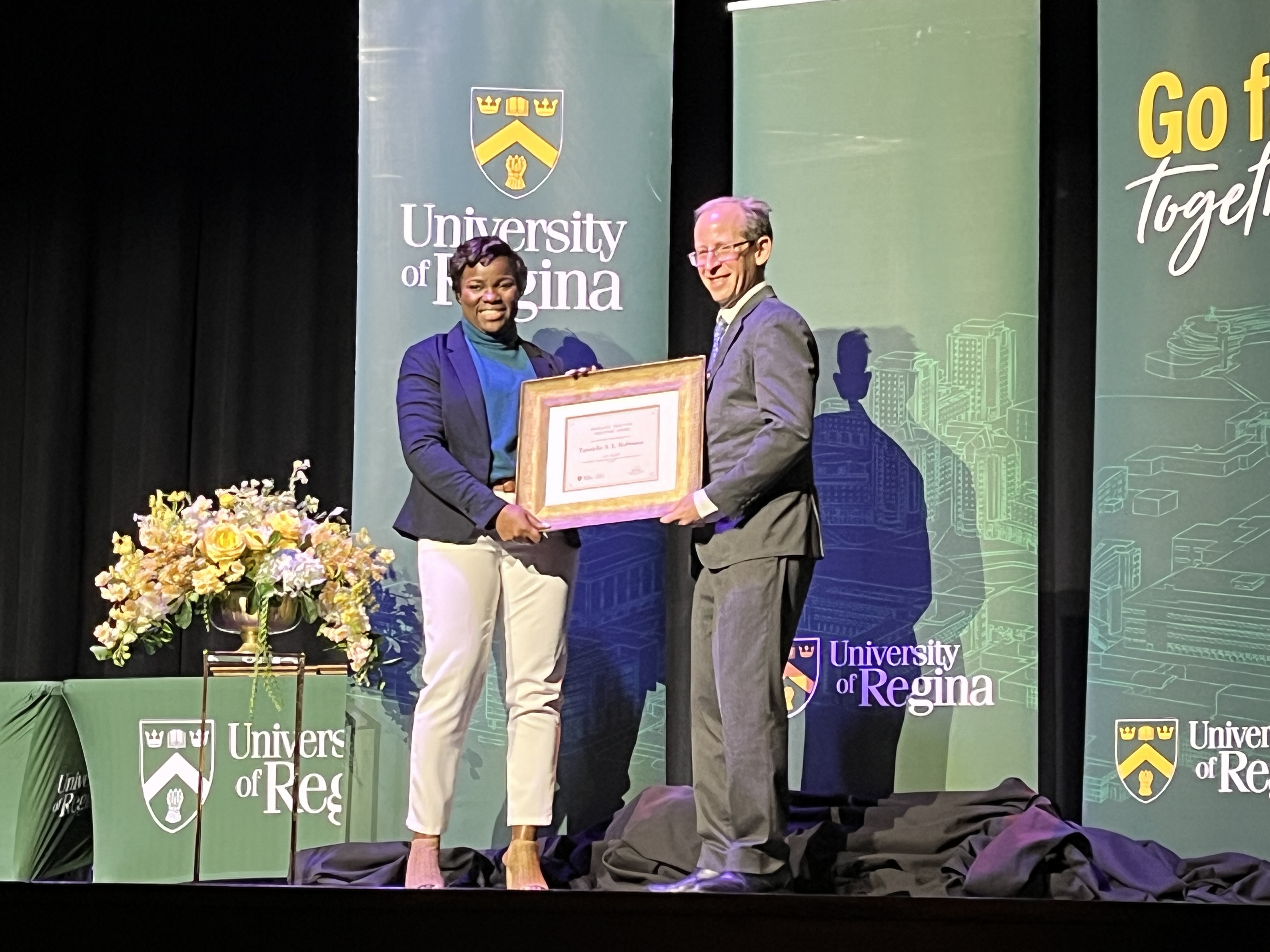
Taneicha Littlejohn Robinson
Taneicha Littlejohn Robinson was the recipient of the Graduate Excellence Award in Teaching Assistance, recognizing her outstanding professionalism, compassion, and excellence as an educator.
A master’s student in English, Taneicha has distinguished herself as one of the most gifted and dedicated teaching assistants in the Department of English and Creative Writing. Her work in the Writing Centre has had a transformative impact—helping students strengthen their writing, clarify their ideas, and gain confidence in forming their own academic voices.
When the English 100 curriculum underwent significant revisions, the writing assistance Taneicha offered inside and outside of class was crucial to the success of instructors and students across the five sections of the course. She developed tailored lessons and resources to assist students and patiently reviewed their writing with them while fostering an inclusive and respectful learning environment. As her supervisor, Dr. Troni Grande, noted: “Taneicha Robinson and done great things for the Department’s Writing Centre. In terms of her unparalleled professionalism, communication skills, and heart for supporting students, Taneicha is in a class by herself.”
Balancing outstanding academic achievement with a remarkable capacity for mentorship, Taneicha has elevated the quality of teaching and learning in the Writing Centre. We are proud to honor Taneicha Littlejohn Robinson with the Graduate Excellence Award in the category of Graduate Teaching Assistant.
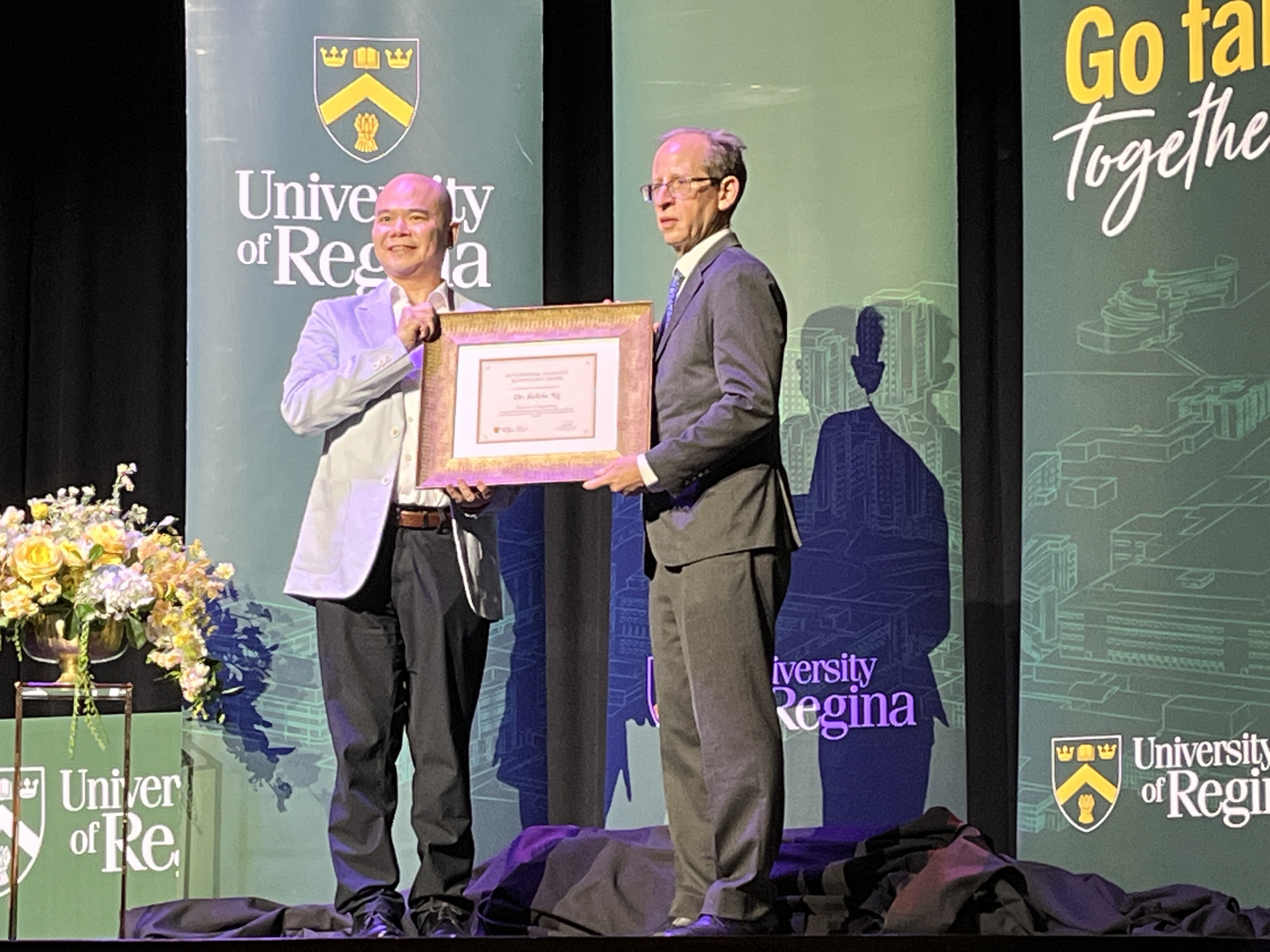
Dr. Kelvin Tsun Wai Ng
Dr. Kelvin Ng is the recipeint of the Outstanding Graduate Supervision Award.
For more than sixteen years, Dr. Ng has mentored undergraduate and graduate students in Environmental Systems Engineering, supervising over forty Highly Qualified Personnel. His students describe his research group as a “welcoming, respectful, and intellectually vibrant space” where creativity, debate, and collaboration thrive. His approach to supervision blends high academic standards with compassion, inspiring and empowering his students to excel.
Dr. Ng is recognized internationally as a leader in sustainable solid waste management research and ranks among the world’s top ten authors in his field, a reputation he is generous in sharing with his students. He has cultivated an inclusive and productive research environment—more than seventy-eight percent of his publications include female co-authors—helping advance Engineers Canada’s 30 by 30 initiative. However, his mentorship extends beyond academic skills to professional and personal development, as he prepares his students for distinguished careers in academia, government, and industry. One student described their journey under his supervision as “nothing short of transformative,” highlighting Dr. Ng’s rare ability to see potential students had not yet discovered in themselves.
A recipient of both the President’s Award for Teaching Excellence and multiple Education for Sustainability Awards, Dr. Ng exemplifies the highest ideals of graduate supervision.
Through his unwavering support, intellectual curiosity, and vision, Dr. Ng has shaped the next generation of research innovators. We are proud to recognize his outstanding contributions with this award.
We recognizeg and thank Dr. Ng for unwavering dedication to inclusive excellence in graduate supervision, supportive mentorship, and student success.

Amy Richter
Dr. Amy Richter, recipient of the Outstanding Young Alumni Award
Dr. Amy Richter is a dedicated professional engineer and environmental advocate, currently contributing her expertise to the Ministry of Environment in Saskatchewan, where she works on advancing waste recycling initiatives. A three-time graduate of the University of Regina, Amy earned her Bachelor of Applied Science (2015), Master of Applied Science (2017), and PhD (2021) in Environmental Systems Engineering. Her academic work, particularly her doctoral research, focused on using data-driven approaches to enhance regional waste management systems across Canada, reflecting her deep commitment to sustainability and environmental innovation. In addition to her role with the Ministry, Amy maintains a strong academic presence as a part-time postdoctoral researcher at the University of Regina. There, she actively mentors graduate students and continues to contribute to research that supports Canada's evolving waste management strategies and environmental practices.
Congratulations Amy on this award!
View the other ACAA Receipients here.

Emily Duncan
Investigating the future of digital agriculture
Dr. Emily Duncan, a U of R postdoctoral researcher, received a prestigious SSHRC Banting Postdoctoral Fellowship worth $140,000 to investigate how digital technologies are reshaping Canadian agriculture—and what that means for farmers, rural communities, and the environment.
Her research examines the growing use of tools like artificial intelligence, automation, and algorithm-based decision-making in agriculture. While these technologies are often promoted as solutions to reduce greenhouse gas emissions and boost productivity, much less is known about how they affect the people and places at the core of our food systems.
“There’s a lot of talk about digital technologies being the key to sustainable agriculture,” says Duncan. “But we also need to understand how these technologies affect farmers, food production, land use, and equity in the sector.”
Her work focuses on one of the fastest-growing trends in this space: the development of carbon markets in agriculture. These markets aim to reward farmers for practices that capture carbon in soils—like no-till farming—which could position Canadian agriculture as part of the solution to climate change. But important questions remain: How will these markets be structured? How will digital tools measure and verify carbon capture? And how do farmers view their role in these emerging systems?
Duncan also plans to explore how digital agriculture and carbon markets intersect with broader issues such as corporate consolidation, farmland ownership, and climate policy.
Her Banting Fellowship will advance critical research to better understand both the opportunities and the risks of digital agricultural technologies—and help build more equitable, sustainable food systems in Canada.
See the rest of this article on "Research projects led by 66 University scholars reflect the incredible diversity of research taking place across campus" at Discourse Magazine.
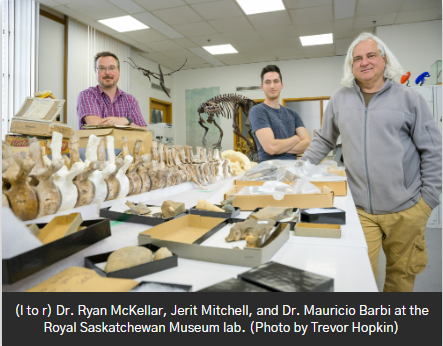
Jerit Mitchell
When PhD student Jerit Mitchell first noticed an odd structure in a 2018 scan of Scotty’s rib, he nearly dismissed it.
“I remember showing my supervisors, Dr. Barbi and Dr. McKellar, a strange structure… They were quick to point out that what I discovered could be preserved blood vessels, which has since led to a much more expansive research project.”
That moment of curiosity sparked years of investigation. Using powerful synchrotron X-rays from the Canadian Light Source, the team created a 3D model of both the bone and the vessel structures without damaging the fossil—revealing not only preserved blood vessel structures, but also a healed fracture from what was likely a violent encounter with another dinosaur.
The find is helping scientists understand dinosaur healing potential, compare injuries across species, and explore how life on Earth evolved over millions of years.
Read the full story in Discourse Magazine Watch the video at Scotty the T. rex or read the national coverage at Conversation Canada
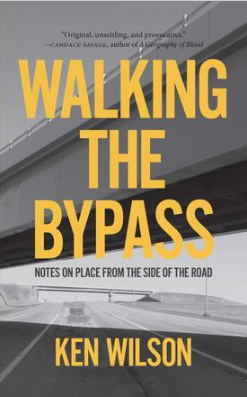
Dr. Ken Wilson (alumni)
Dr. Ken Wilson is celebrating his forthcoming book, Walking the Bypass: Notes on Place From the Side of the Road, based on his PhD work in MAP's interdisciplinary artistic and media research program, co-supervised by Jim Daschuk and Sherry Farrell-Racette. Ken was that PhD program's first graduate, and his research received the President's Distinguished Graduate Student Award.
Walking the Bypass will be officially released on October 14 by University of Regina Press here.

Marjorie Roden
"My novel, Preflight Launch: The Missing Chapters, is a science fiction novel based mostly in Saskatchewan. Taking place in the 2200's, it shows a dystopian future where anyone who uses older technology and traditional knowledge is seen as rebellious. Although the characters were created as part of a web series made in 2013 through to 2016, one does not need to have watched the series to appreciate the book, as very little of any of the webisodes appears in the book."
Marjorie's book, Preflight Launch: The Missing Chapters, can be found on Amazon.
Marjorie D.L. Roden is a proud woman of Norwegian, English, Irish, Scottish, and Cree ancestry. She grew up near Prince Albert, Saskatchewan and loves to do varied forms of artwork, including but not limited to writing, painting (such as the cover of this, her first novel), drawing, performing, and designing clothing. She’s also a farmer, who loves nature and preservation of the natural elements. Her mother Diana was also creative, allowing her the unusual freedom of exploring as many forms of artwork from the time she was able to pick up a pencil or paintbrush. Thanks to the influences made by her mother to value education, Marjorie has earned her Bachelor of Education Degree in Physical Geography and Visual Arts (Usask 1998), Certificate in Media Arts Production at SIAST Woodland Campus (Prince Albert, 2007), and certifications through the National Screen Institute of Canada in Winnipeg (2008) & Acting for Film and Television (Academy of Business, Winnipeg, 2009), and her Bachelor of Arts Degree in Theatre and Film Studies (U Manitoba,2018). The final wish her mother made was for Marjorie to complete her Master of Fine Arts in F ilm & Television prodiction, which is exactly what Marjorie shall be completing in the months following this book’s release.
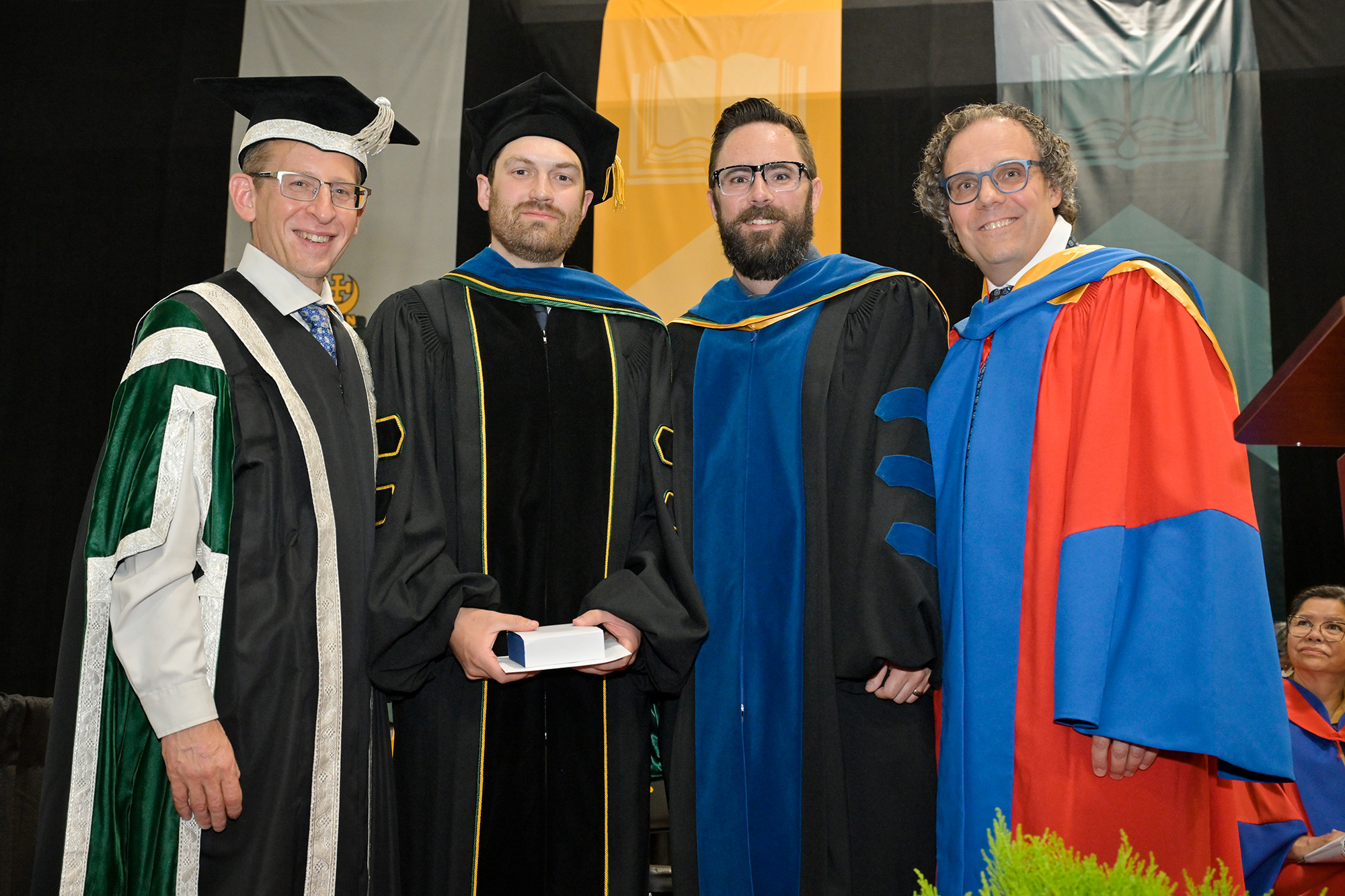
Dr. Brendan Bishop
Congratulations to Dr. Brendan Bishop, recipient of the Governor General’s Academic Gold Medal!
Dr. Bishop is being recognized for his outstanding doctoral research on critical mineral extraction from coal waste and subsurface brines in Western Canada. With a remarkable 92% average and six published articles—including two in Environmental Science & Technology—his academic excellence speaks for itself.
Beyond the lab, Brendan also founded the Department of Earth Sciences’ student chapter of the Society for Economic Geologists. His supervisor called him “a once in a career PhD student.”
Next, Brendan will be starting his Postdoctoral Fellowship - "Excited to begin my Natural Sciences and Engineering Research Council of Canada (NSERC) funded Postdoctoral Fellowship at the Jackson School of Geosciences at The University of Texas at Austin."
Great job, Brendan and wishing you future success!

Adhika Ezra, MA
Adhika Ezra won Best Student Paper Award - MA Category from the Canadian Sociological Association, on his research "The Role of Milieu in Governance: The Case of Homelessness and Extreme Weather in Regina."
Extreme weather events increase the risk of disaster for people experiencing homelessness (PEH) who are exposed to harsh temperatures. Based on a qualitative case study in Regina, Saskatchewan involving 22 service providers, city officials, and advocates, I use the concept of governmentality to analyze how homeless governance and extreme weather responses contribute to the marginalization of PEH. Governmentality coordinates social life by considering the non-linear interrelations of rationalities, societal rules and expectations, governance techniques, and the environment. In an advanced liberal society, governance relies on shaping the milieu and determining possible fields of action that align with the desired outcomes of governance.
The findings show that shelter bans, shelter rotations, encampment evictions, move-along orders, and people’s reluctance to enter shelters are attached to rationalities of responsibilization, colonial Othering, private property, and the market. These forms of governance shape the milieu by dictating spatial circulations which end up denying PEH access to safe shelters. The milieu is also shaped by weather; during extreme weather, PEH is pressured to enter shelters. PEH who enter face the risk of re-traumatization and must accept disciplinary rules. Others without a shelter find ways to adapt, but face increased risk of getting injured-or worse-from maladaptation or direct exposure to extreme temperatures. By describing the interaction between technologies and rationalities of governance, weather, and spatial circulation, I argue that weather is accounted for by governmentality: 1) as part of the milieu that shapes people’s possible field of action, indirectly guiding people to consent to be disciplined; 2) to punish PEH who are unable to be “responsible.” Environmental disasters are a product of homeless governance that marginalizes PEH.
This outstanding MA-level paper offers a compelling and theoretically grounded analysis of how neoliberal and settler colonial governance structures shape the lived experiences of people experiencing homelessness (PEH) in Regina, Saskatchewan — particularly during extreme weather events. Drawing on 22 qualitative interviews with service providers, city officials, and advocates, the author skillfully applies Foucault’s concept of governmentality and milieu to explore how space, climate, and institutional practices intersect to produce exclusion and risk. The paper is notable for its nuanced attention to the complexities of trauma, substance use, and Indigenous dispossession, and for its clear, well-structured argumentation. The committee was especially impressed by the paper’s ability to synthesize theory and grounded research into a meaningful critique of policy and practice.
For more on his research and the award, visit the CSA site here.

Shaelyn Carr, Psychology
Warm congratulations to our very own Shaelyn Carr, who has been named a finalist in the national SSHRC Storytellers Challenge!
Her powerful research, "Innocent Until Proven Guilty? Or Guilty Until Believed?", tackles critical issues in the justice system and holds profound policy and public interest implications.
Shaelyn Carr is a PhD student in Experimental and Applied Psychology at the University of Regina, where she also completed her master’s degree. Her master’s thesis focused on a novel eyewitness lineup technique designed for use with children. She received a SSHRC Doctoral Award to support her PhD studies from 2024 to 2027, to support her research into alibi witness evidence with the goal of providing a more comprehensive understanding of this area. Her work explores how judges evaluate and weigh alibi evidence, how alibi witness evidence is perceived, and how both truthful and deceptive alibi witnesses generate their narratives.
Shaelyn’s broader research interests fall within the realm of forensic psychology, with a specific focus on alibi evidence, memory and accuracy of witnesses (both children and adults), lawyer interviewing techniques with children, and police interview practices with children.
Earlier this year, Shaelyn won FGSR’s internal SSHRC Storytelling Challenge, and we’re thrilled that her video has now earned her a spot as the University of Regina’s first-ever finalist in this prestigious national competition. For SSHRC's official announcement, visit here.
Shae’s outstanding student leadership and communication skills mark her as one of Canada’s top emerging scholars.
📽️ Watch Shae's video here.
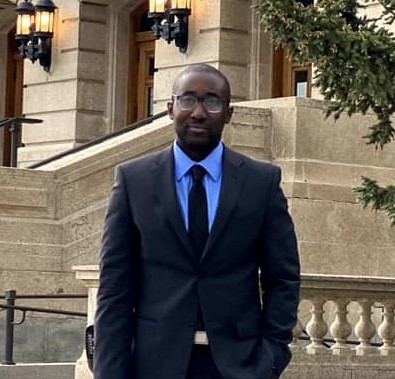
Kwaku Ayisi
Congratulations to Kwaku Ayisi on the launch of his ARMS podcast series which was funded by the Digital Research Alliance of Canada.
The Digital Research Alliance of Canada awarded Kwaku Ayisi the DRI EDIA Champions funding for his project, “Academic Research Made Simple.” He aims to present the incredible research being done at the U of R to a wider audience through podcast interviews with racial minority graduate students and faculty.
The ARMS podcast series includes one-on-one interviews with racialized graduate research students (Masters and PhD) and racialized faculty with the discussion focusing on a research study they have conducted or in the process of conducting.
Watch the videos here on UR YouTube Channel.

Desia
Congratulations to Delasi Essien, awarded "Nursing Champion" through Canada's Top 25 Immigrants for the 2024 year.
As a doctoral student at the University of Regina, Essien further found her niche in academia, expanding the dialogue around equity, diversity and inclusion, through Indigenization and decolonization within the nursing profession.
For more information, you can watch the video here or read the article here.